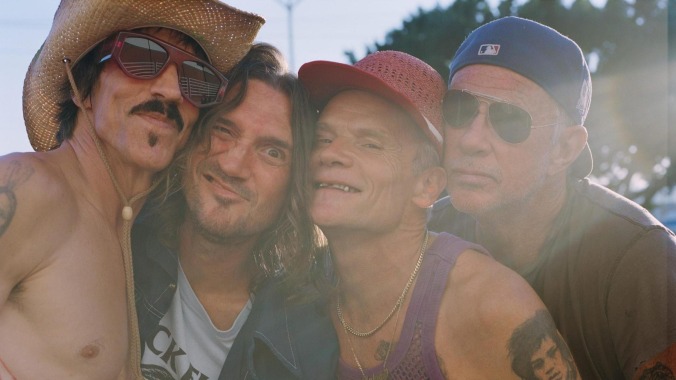Red Hot Chili Peppers trade easy hooks for surprising depth on Unlimited Love
Guitarist John Frusciante is back, and the band sounds like they want to pretend he never left

Kick out the guitarist in your band and replace him with the guy he was originally brought in to replace. It sounds awkward, but the Red Hot Chili Peppers’ moves over the past few years aren’t without reason: The chemistry of vocalist Anthony Kiedis, drummer Chad Smith, bassist Flea, and returning guitar virtuoso John Frusciante—the band lineup during their early ’90s and ’00s heydays—was always notable for its distinct musical fusion. (Even if the culture at large went so far as to enjoy a short-lived comedy podcast dedicated to a loving mockery of the percussive, funky, pop-rock gibberish for which the band is known.)
The meme-ification of the band was an easy stereotype: releasing one album 11 times, and people not noticing. And sure, there’s some truth there—the band always sounds like itself—but no fan of Red Hot Chili Peppers would mistake a Blood Sugar Sex Magik track with a tune from I’m With You. On Unlimited Love, the quartet makes an odd choice in its endless experiment of what latest topping to put on its musical sundae: to sound like it did when Frusciante left, but skirt into new sounds without being as catchy.
The album starts with “Black Summer,” a Californication-esque track mixed with a sea shanty listening session. That song (the first single released) is actually the earworm of the album, indicating the lack of stadium-filling melodies that will likely turn off more casual fans expecting hits akin to those from Frusciante’s previous stint. Gone are the endless hooks wedded to Kiedis’ ratatat vocals spitting out something meaningless but catchy; what remains are songs that don’t hit as hard on first impact, but grow over time. Most important of all, Kiedis largely stays out of his own shamalama-hoosegow way, a fresh change from recent albums.
The other sounds on Unlimited Love tend to lean a few different ways. Some are new wave- influenced, others more hardcore or punk-derived, while the bulk of the record turns to funk or disco, albeit through the eyes of an aging rock band. “Here Ever After” sounds closer to Gang Of Four than anything they’ve done since By The Way, but with lesser success. And “Aquatic Mouth Dance” is fun if you’re there for the groove but not the lyrics—the closest the album comes to reverting to the weakness of Kiedis’ worst tendencies, instead of the strength of the band—while “Not The One” sounds like a beach-bound By The Way track.
But oh, the high point. “She’s A Lover” is one of the greatest songs the band has written, certainly over the past 20 years. A straightforward disco-funk tune without a real rock twist outside of its guitar solo, the chorus manages to both display Flea’s unique bass skills while also nailing an undeniable hook. It doubles as the title track—“Unlimited love again” is shouted throughout one of the pre-choruses—but for a band verging on 40 years old, it sounds both entirely new while staying completely in line with what you’d want from them.
Sometimes, RHCP tries to teeter into that idea but fails, as tracks like “The Great Apes” and “White Braids & Pillow Chair” focus too much on one- or two-note melodies without the music providing enough support worth celebrating. These songs resemble B-sides from a previous era. “These Are The Ways” comes across like the band is trying to be Green Day, but hardcore fans may find it sounds like a weaker version of “Mini Epic (Kill For Your Country).” Similarly, “One Way Traffic” sounds like the halfway point between older cuts like “Storm In A Teacup” and “Save The Population,” and not in a good way—it pairs a stale verse with a chorus that lacks redeeming value.
Frusciante, the guitarist affiliated with all the band’s best work, has returned, but he mostly takes a backseat to Flea. Rather than sounding like guitar-based melodic songwriting, tracks like “One Way Traffic,” with its killer bass solo, sound like they came from casual jam sessions. Maybe that’s for the better, as it occasionally leads to wholly unique takes: “Whatchu Thinkin’” falls somewhere between a John Cage piano piece, a Radiohead song, and the stereotype of the Red Hot Chili Peppers of old. “The Heavy Wing” has Frusciante on lead vocals for the chorus, and the guitar solo is unmistakably him, while the arrangements around it sound like a different band, in the best way possible. “Let ’Em Cry” verges on something off of Abbey Road, with touches of “She’s So Heavy” ringing out as Smith gallops on his single pedal. Similarly, the album closer, “Tangelo,” is a drum-less ballad that’s as close to a John Lennon song as the group will ever write.
Unlimited Love has its limits; mostly the band plays it safe and hews to previous sounds. But it also unexpectedly shines: The combination of old styles transforms into an eclectic set of new ones. Frusciante’s presence is felt less in shredding guitar play than in the tasteful backing vocals and synthesizers across the album. Casual fans may be disappointed by the lack of hooks until they’ve heard it another twenty times, while hardcore fans will slowly discover there’s a musical depth the Peppers have long been striving for. The bulk of the album blends into its own flavor, and it’s a good one. Unlimited Love doesn’t do it all, but what it does, it does damn well.